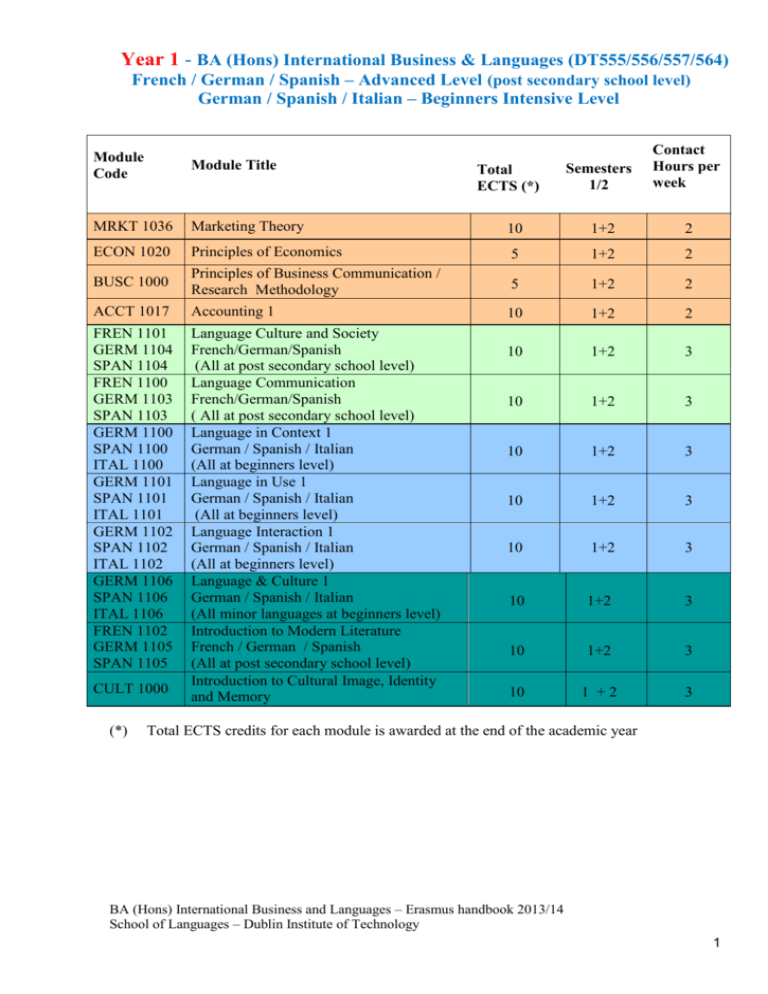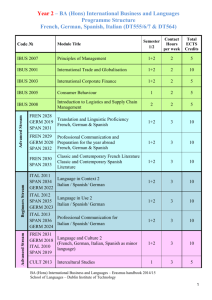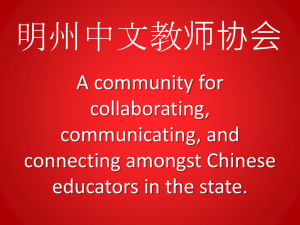IBL1 Programme structure & module descriptors 2013-2014
advertisement

Year 1 - BA (Hons) International Business & Languages (DT555/556/557/564) French / German / Spanish – Advanced Level (post secondary school level) German / Spanish / Italian – Beginners Intensive Level Semesters 1/2 Contact Hours per week 10 1+2 2 Principles of Economics 5 1+2 2 BUSC 1000 Principles of Business Communication / Research Methodology 5 1+2 2 ACCT 1017 Accounting 1 10 1+2 2 FREN 1101 GERM 1104 SPAN 1104 FREN 1100 GERM 1103 SPAN 1103 GERM 1100 SPAN 1100 ITAL 1100 GERM 1101 SPAN 1101 ITAL 1101 GERM 1102 SPAN 1102 ITAL 1102 GERM 1106 SPAN 1106 ITAL 1106 FREN 1102 GERM 1105 SPAN 1105 Language Culture and Society French/German/Spanish (All at post secondary school level) Language Communication French/German/Spanish ( All at post secondary school level) Language in Context 1 German / Spanish / Italian (All at beginners level) Language in Use 1 German / Spanish / Italian (All at beginners level) Language Interaction 1 German / Spanish / Italian (All at beginners level) Language & Culture 1 German / Spanish / Italian (All minor languages at beginners level) Introduction to Modern Literature French / German / Spanish (All at post secondary school level) Introduction to Cultural Image, Identity and Memory 10 1+2 3 10 1+2 3 10 1+2 3 10 1+2 3 10 1+2 3 10 1+2 3 10 1+2 3 10 1 +2 3 Module Code Module Title MRKT 1036 Marketing Theory ECON 1020 CULT 1000 (*) Total ECTS (*) Total ECTS credits for each module is awarded at the end of the academic year BA (Hons) International Business and Languages – Erasmus handbook 2013/14 School of Languages – Dublin Institute of Technology 1 BA (Hons) Chinese and International Business - DT565 Year 1 Module Code Module Title Total ECTS* Semesters 1 and 2 Contact hours per week MRKT 1036 Marketing Theory 10 1+2 2 ECON 1020 Principles of Economics 5 1+2 2 BUSC 1000 Principles of Business Communication / Research Methodology 5 1+2 2 ACCT 1017 Accounting 1 10 1+2 2 CHIN 1001 Chinese Language Levels 1 & 2 10 1+2 4 CHIN 1101 Chinese Cultural Studies 1: Oral Communication 10 1+2 1 CHIN 1102 Chinese Cultural Studies 2: Chinese History 5 1+2 4 CHIN 1002 Chinese Language Levels 3 & 4 5 1+2 4 (*) Total ECTS credits for each module is awarded at the end of the academic year BA (Hons) International Business and Languages – Erasmus handbook 2013/14 School of Languages – Dublin Institute of Technology 2 BA (Hons) International Business and English- DT558 Year 1 Code Module Title Title Total Semesters ECTS 1 and 2 (*) Contact hours per week MRKT 1036 Marketing Theory 10 1+2 2 ECON 1020 Principles of Economics 5 1+2 2 BUSC 1000 Principles of Business Communication / Research Methodology 5 1+2 2 ACCT 1017 Accounting 1 10 1+2 2 ENGL 3004 Written Expression and Textual Analysis (**) 10 1+2 4 ENGL 3005 Cultural Awareness & Oral Skills(**) 10 1+2 2 10 1+2 3 Minor Language (please refer to modules available subject to resources shown in page 1) (*) Total ECTS credits for each module is awarded at the end of the academic year (**) Modules open to Erasmus students who have passed the English for Academic Purpose test at Upper Intermediate level BA (Hons) International Business and Languages – Erasmus handbook 2013/14 School of Languages – Dublin Institute of Technology 3 BA (Hons) International Business and Languages Year 1 – Module Descriptors Business modules Marketing Theory All organisations, whether commercial or not-for-profit, depend on marketing to understand and address the requirements of customers, and also to facilitate a proactive approach to a competitive marketplace. This module provides students with a comprehensive grounding in the core marketing concepts, theories and principles most relevant to the student’s future development of marketing strategies and the implementation of marketing practice. Principles of Economics In this course the students will study the fundamental principles and concepts of Economics. The course will examine the theoretical background of both Micro and Macro Economics. This includes the examination of the market and how it operates in allocating our scarce resources, the use of the market in managing the national economy both domestically and in the global environment and a comparison with other national and regional economies. This module deals with the practical application of effective communication skills. Good communication is increasingly Business Communication/ recognised as being essential to the smooth running of business operations everywhere. This entails a learning content that prepares Research Methodology students to communicate clearly and also to appreciate the dynamics of group/team work. Accounting 1 This is a course in the fundamentals of accounting. It presumes no prior knowledge of accounting from second level, however there is material that students who have studied the subject before will find challenging. The student is introduced to the key concepts underlying accounting and recording business transactions. It also encompasses the preparation of financial statements for different business entities. It sets the foundation for further study in the area. BA (Hons) International Business and Languages – Erasmus handbook 2013/14 School of Languages – Dublin Institute of Technology 4 Language modules Culture and Society Communication Language in Context 1 Language in Use 1 Language Interaction 1 Introduction to Modern French Literature Introduction to Modern Spanish Literature This module is structured around student understanding of the target language culture while developing their language and intercultural competencies. The module provides students with an understanding and awareness of social customs and practices in target-language countries and seeks to improve student survival skills while on trips and short stays in the target language countries. The module develops all 4 key skills; oral, listening, reading and writing. It progresses student understanding of selected topics. It builds on student understanding of fundamental aspects of English and Target Language grammar systems and develops students’ ability to identify and apply essential grammatical structures in the foreign language. This module introduces students to the target language and its culture. The topics studied in the module will be introduced through a variety of materials in the target language, with a view to making learners more aware of fundamental intercultural differences when communicating in the foreign language. This module introduces students to the target language and its structures. The topics studied in the module will be introduced through a variety of texts in the target language, with a view to increasing learners aware of the sounds, lexicon and structure of their language of study. This module introduces students to different types of interaction in the target language. The topics studied in the module will be introduced through a variety of texts in the target language, with a view to enabling learners to communicate effectively at a basic level in their language of study. Introduction to Modern French literature presents an overview of French Literature through the ages, but with an emphasis on Contemporary literature in its varied forms. Students are introduced to a variety of literary forms and read a range of narratives drawn from fiction, short story, poetry, plays, novels, bande dessinée, song and film. They study elements of style, structure and character. The course is presented within a broad cultural and social context. By including singers/songwriters, the module also seeks to give insight into a vibrant aspect of Francophone popular culture and looks at their contribution to French cultural identity Introduction to Spanish and Latin-American literary texts presents an overview of Spanish Literature through the ages. The emphasis is on the chronological development of Spanish and Latin-American literature through the study of the most representatives authors. Students are introduced to a variety of literary genres and read and discuss a range of narratives drawn from poetry, plays, novels, short stories, and films. They study elements of style, structure and character. The course is set within a broad cultural, social and historical context. By including film versions of literary works, the module also seeks to give insight into a vibrant aspect of Hispanic popular culture and looks at their contribution to Hispanic cultural identity. BA (Hons) International Business and Languages – Erasmus handbook 2013/14 School of Languages – Dublin Institute of Technology 5 Introduction to Modern German Literature The course introduces the first-year student to the study of the literature, literary criticism and literary history of the German-speaking world. It broadly examines the role and institutions of the German-speaking media to highlight the relevance of the literary contribution to cultural and political life. The course surveys key ideas, concepts and terminology pertaining to genre, epoch and discourse essential for the study of literature. The course focusses on texts of the period 1945 to 2010, linking literary practice and production to their historical background and their role in contemporary society. Minor Language: Language and Culture 1 This First Year module introduces the learners to the target language and its culture. Introduction to Cultural Image, Identity & Memory This module introduces students to a range of questions and issues surrounding cultural imagery, identity and memory and develops student understanding of the formation and mediation of cultural identity and memory. The module also explores how cultural memories and both dominant and more marginalized narratives of the past are represented and reflected in tourism and heritage industries. BA (Hons) Chinese and International Business (DT565): Language Modules Chinese Levels 1 and 2 (only DT 565) This module introduces students to basic spoken communicative Chinese with emphasis on pinyin (roman alphabet-based transcription system for Chinese), although characters will also form part of the instruction material. Chinese Cultural Studies 1: Oral Communication (only DT 565) This module is designed to help students reinforce their knowledge of oral Chinese. Chinese Language Levels 3 & 4 (only DT 565) This module introduces students to basic written Chinese – both simplified and traditional – with the emphasis on the simplified system. Oral Chinese is to be used as a means of reinforcing reading and writing skills. Chinese Cultural Studies 2: Chinese History (only DT 565) This module introduces students to Chinese cultural contexts and contemporary situation with an emphasis on Chinese History. BA (Hons) International Business and Languages – Erasmus handbook 2013/14 School of Languages – Dublin Institute of Technology 6 BA (Hons) International Business and English (DT558): Language modules open to Erasmus students provided they pass the English for Academic Purpose Upper Intermediate level Written Expression and Textual Analysis Cultural Awareness This module practices written expression and analysis of texts in English. Active student involvement in the reading and writing of essays and compositions of various sorts is an essential feature of this module. This module introduces students to the cultural background of their host country, Ireland, as well as other English-speaking geographies. Students will study key aspects of history, society, politics, economy, education systems and working life in Ireland and other English-speaking countries and express themselves both orally and in writing on a selection of these topics. BA (Hons) International Business and Languages – Erasmus handbook 2013/14 School of Languages – Dublin Institute of Technology 7





